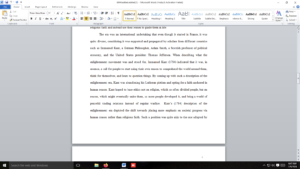Ages of Exploration and Enlightenment
Hello Again, so, this is the exact same assignment you just completed for me, but my Professor said that he couldn’t accept the paper you wrote because it did NOT utilize the source material from our class that I sent you. I will attach the paper you wrote, can I please get a re-write. This time please use the source material I am attaching only.
To distinguish the 1700s from the Reformation Era before it, which was still an “age of faith” like the medieval era, scholars have variously named the 1700s. The most famous label –the “Enlightenment Era”– wisely sidesteps an issue raised by the other names, which is this essay’s focus: Was the Enlightment primarily an “age of reason” or was it instead or also an “age of sentiment,” or feeling? Do our readings and sources recommend one of these labels more than the other, or can they be harmonized instead of opposed?
Requirements: 1500 Words
Answer preview
The era was an international undertaking that even though it started in France, it was quite diverse, considering it was supported and propagated by scholars from different countries such as Immanuel Kant, a German Philosopher, Adam Smith, a Scottish professor of political economy, and the United States president Thomas Jefferson. When describing what the enlightenment movement was and stood for, Immanuel Kant (1784) indicated that it was, in essence, a call for people to start using their own reason to comprehend the world around them, think for themselves, and learn to question things. By coming up with such a description of the enlightenment era, Kant was abandoning his Lutheran pietism and opting for a faith anchored in human reason. Kant hoped to base ethics not on religion, which so often divided people, but on reason, which might eventually unite them, as more people developed it, and bring a world of peaceful trading relations instead of regular warfare.
[1564 Words]

Ages of Exploration and Enlightenment

